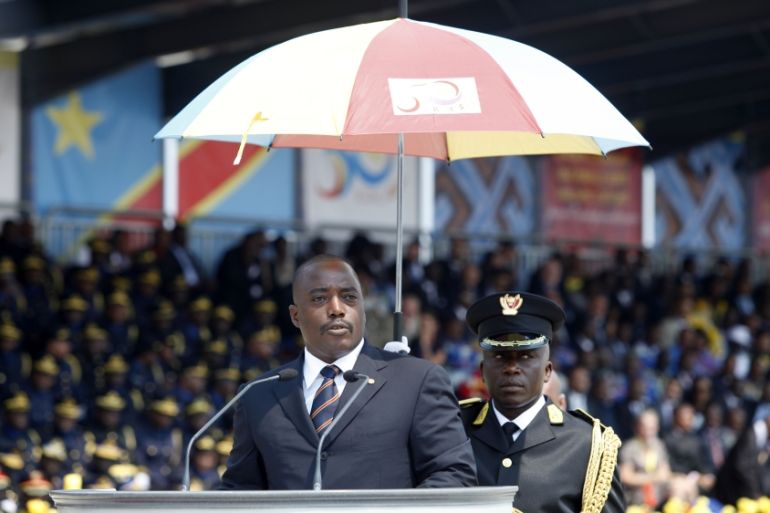HRW warns of government repression in advance of DRC elections
DRC government spokesman says information by US-based rights group is ‘wrong’, accuses it of bias.

A human rights group has warned that government repression in the Democratic Republic of the Congo (DRC) is raising fears of widespread political violence months before scheduled elections.
After two delays, voters in the DRC are expected to head to the polls on December 23, 2018. But there is still a lack of clarity over the participation or not of President Joseph Kabila, whose second term officially ended in 2016 and is constitutionally ineligible for the upcoming poll.
Keep reading
list of 4 itemsIn protests-hit DRC, a fierce power struggle deepens
DRC PM lashes out at ‘arbitrary’ detention of justice minister
‘Father of democracy’: DRC’s Etienne Tshisekedi laid to rest
Human Rights Watch, a US-based rights group, urged on on Friday the international community to increase pressure on Kabila and other senior officials “to take urgent steps to enable free and fair elections”.
It said that the ruling People’s Party for Reconstruction and Democracy and government security forces have used repression, violence and corruption over the past three years to extend their hold on power, including against the Catholic Church which organised earlier this year anti-Kabila protests.
HRW alleged that ruling party officials recruited and paid several hundred youth to infiltrate churches, arrest priests when they attempted to march after the services, and beat those who resisted.
The youth were also instructed to provoke violence and disorder to prevent the marches from going forward and to “justify” a brutal response from the security forces, the rights group added.
Ruling party youth league members have been trained and mobilised to carry out similar violent disruptions during upcoming protests, five members told HRW, the rights group alleged.
“For the moment, we’re on standby. We’re waiting for the Catholics to plan the next protest, and then we’ll organise our counter-demonstrations. This time, it will be terrible,” one of the youth league members said, according to HRW.
The DRC’s government rejected the allegations, accusing the HRW of bias.
“That is nonsense,” Lambert Mende, the country’s communications minister and government spokesman, told Al Jazeera on Friday.
“What is our youth’s business with other parties? Their information is wrong. It is ‘stupidity’ and they are just trying to say something that they are not sure of.”
December polls
Under the DRC’s constitution, a president can only serve two, consecutive, five-year terms.
So far, Kabila has not clearly stated whether he will step aside, despite appeals from the international community to publicly say he will not run for re-election. His rivals accuse him of wanting to stay in power.
“There is still considerable uncertainty whether President Kabila will step down in accordance with the constitution and permit a credible vote that would mark Congo’s first democratic transition since independence,” said Ida Sawyer, Central Africa director at HRW.
“Kabila’s failure to do so would heighten the risk of large-scale violence and instability, with potentially devastating consequences across the region,” Sawyer added.
But DRC’s Prime Minister Bruno Tshibala recently said that Kabila will respect the constitution and will not seek a third mandate.
Mende, the communications minister, said on Friday that all parties will convent in July to choose their presidential candidates.
“Wait [until] next month and you will know if Kabila will be candidate or not,” he said, when asked by Al Jazeera. “I can tell you ‘no’, I can tell you ‘yes’ but if time has not yet come for the candidate to be announced officially, why should we talk about it?
“To my knowledge, Kabila has already said he will respect the constitution,” the minister added. “The constitution has not been changed.”
Kabila came to power in 2001 after the assassination of his father, Laurent-Desire Kabila, the country’s third president.
He was elected in 2006 in the country’s first democratic election since it gained independence from Belgium in 1960. Kabila secured a second term in 2011, though that election was plagued by allegations of widespread voter fraud.
Calls for Kabila to resign have been met with deadly violence amid widespread anger over what some see as the president’s refusal to relinquish power after the end of his second full term in December 2016.
Civil society groups and human rights activists are calling for sustained pressure on the president to step down.
Most of the protests occurred in opposition strongholds like the Kasai region and North and South Kivu, leaving scores dead.
![Calls for President Kabila to step aside have been met with deadly violence [The Associated Press]](/wp-content/uploads/2016/09/feb58bd096bf499faf5d274b56abd11f_8.jpeg)